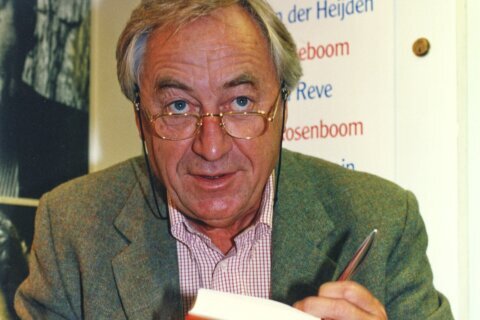FREDERICK, Md. — Looking for something fun to do after Pope Francis leaves D.C. for New York?
Take a quick jaunt up I-270 to country music heaven at the Great Frederick Fair, which brings in big stars year in and year out, from Conway Twitty to Reba McEntire, from Willie Nelson to Charley Pride.
This year, the annual event kicked off with blue-collar comedian Jeff Foxworthy (“You Might Be a Redneck”) and country legend Dwight Yoakam (“Guitars, Cadillacs”), who performed last weekend.
It continues this week with a string of country stars: Joe Diffie, Sammy Kershaw and Aaron Tippin on Thursday; Chase Bryant, Kellie Pickler and Easton Corbin on Friday; and Josh Turner on Saturday.
WTOP caught up with Diffie and Kershaw to discuss their show as part of the “Roots & Boots Tour,” which as the title suggests, aims to get country music back to its honky-tonk roots.
https://www.youtube.com/watch?v=QQ4VNinadTY
“Some of us guys in the ’90s went through a rough time there for a while, where we didn’t have very many shows anymore with the music changing,” Kershaw tells WTOP. “I was just trying to think of some ways to get us more shows … and one morning I woke up and I said, what if I find a couple other guys who had a bunch of big hit records in the ’90s and we’ll go out and do a little acoustic tour.”
There’s strength in numbers, as country fans show up to watch the trio of Kershaw, Diffie and Tippin.
“In Nashville, some of the business folks in the record business said there’s no way that’ll ever work, a couple guys sitting on stools unplugged and holding five, six, seven, ten-thousand people for 90 minutes,” Kershaw says. “What they weren’t filtering in was myself and Aaron and Joe, we’ve had about 100 hit records. … We just bust ’em in the mouth with a song, then as soon as Aaron’s finished, I’ll bust ’em in the mouth with a song, then Joe does. We get to do the top six or seven songs each one of us had … The whole audience is singing every word to every one of our songs.”
Kershaw’s rise began with the breakthrough single “Cadillac Style” (1991), which hit No. 3 on country radio off his debut album “Don’t Go Near the Water,” his first of three platinum-selling albums.
“I hated the song the first time I heard it,” Kershaw admits. “The very first song my producer sent to me from Nashville, I saw the postman put the cassette tape in the mailbox. I went in the house, put it in, got halfway through and I shut it off. Man I hated it. It was terrible! … Then of course, I went to Nashville and we cut it and we were listening back in the control room and I said, ‘yeah man, that is me.’ And of course, that’s the song that started my whole career off in ’91.”
His next album, “Haunted Heart” (1994), spawned four more Top 10 country radio hits. “Queen of My Double-Wide Trailer” hit No. 7, the title track “Haunted Heart” hit No. 9, “I Can’t Reach Her Anymore” hit No. 3 and the iconic “She Don’t Know She’s Beautiful” went all the way to No. 1.
“‘She Don’t Know She’s Beautiful,’ every year since ’93, it has been in the Top 100 songs played year after year since ’93. That’s a long time! I wish I woulda wrote it. With a song like that, you know you’ll always be relevant. That song will always be played on country radio, even after you’re gone.”
His gold-selling third album, “Feelin’ Good Train” (1994), landed another pair of hits, as “National Working Woman’s Holiday” and “Third-Rate Romance” both hit No. 2 on the country charts.
“God was good to me. He gave me quite a few songs like that,” Kershaw says. “I’m just lucky man.”
Kershaw’s Frederick Fair colleagues were just as fortunate when it came to country radio.
Tippin landed nine Top 10 hits on country radio from 1990-2001, including “You’ve Got to Stand for Something” (1990), “There Ain’t Nothin’ Wrong With the Radio” (1992), “That’s As Close As I’ll Get to Loving You” (1995), “Kiss This” (2000) and “Where the Stars and Stripes and the Eagle Fly” (2001).
Still, the most successful of the “Roots and Boots” trio was undoubtedly Diffie.
Diffie’s debut album, “A Thousand Winding Roads” (1990), spawned five major hits on country radio, as “Home” and “If the Devil Danced (In Empty Pockets)” both hit No. 1, while “If You Want Me To” and “New Way (To Light Up an Old Flame”)” both hit No. 2. His next album, “Regular Joe” (1992), saw two Top 5 country singles in “Is It Cold in Here” and his personal favorite “Ships That Don’t Come In.”
“It’s a very poignant song and it seems to mean different things to different people. I get a lot of great stories from our military folks actually who tell me that they really like that song,” Diffie says. “It was during the Desert Storm thing and my producer brought it to me and I was like, ‘man I don’t know, I don’t want people to think I’m taking advantage’ … but he said it’s not that what it’s about.”
His third album “Honky Tonk Attitude” (1993) went platinum, spawning three more Top 5 hits in “Honky Tonk Attitude,” “John Deere Green” and “Prop Me Up Beside the Jukebox (If I Die).”
“(‘Jukebox’) that’s a cool song right there,” Diffie says. “I was at the Academy of Country Music Awards in Hollywood one year near when that came out. I was out in the hallway and I hear somebody say, ‘Hey, Joe!’ I looked around and I saw Liza Minnelli. She goes, ‘Hey Joe! I just wanna tell you I love ‘Prop Me Up Beside the Jukebox.’ I was like, ‘Wow! How’d you even hear that?'”
Judy Garland’s daughter Liza may have loved “Prop Me Up Beside the Jukebox,” but Diffie’s own mother hated the other major hit off the same album, the upbeat “John Deere Green.”
“I played it for my parents and my mom cried. She hated it. She thought it was rock ‘n roll,” Diffie says, laughing at the irony. “It’s still my most popular song probably.”
The song describes a small-town guy who writes “Billy Bob loves Charlene” on a water tower in the same shade of green paint as a John Deere tractor. Songwriter Dennis Linde, who wrote “Burning Love” for Elvis Presley, actually kept a mural of a fictional town where Billy Bob and Charlene supposedly lived alongside characters from his other songs, like Earl from The Dixie Chicks’ “Goodbye Earl” and Bubba from Mark Chesnutt’s “Bubba Shot the Jukebox.” How’s that for trivia?
He went platinum again with his fourth album, “Third Rock From the Sun” (1994), which spawned the No. 2 hit “So Help Me Girl” and a pair of No. 1 hits in “Pickup Man” and “Third Rock From the Sun.”
“I wanted this other song that I liked better than ‘Third Rock’ at the time and the publisher didn’t wanna give it to me because Garth (Brooks) wanted ‘Third Rock.’ So we said we’ll record both songs if you let us have that one, so they did. … It was early in Garth’s career and he hadn’t exploded like he did after that, so nowadays they’d laugh at me and give it to Garth.”
Over the next six years, Diffie scored five more Top 10 hits, as “Bigger Than the Beatles” (1995) went all the way to No. 1, “Texas-Sized Heartache” (1998) hit No. 4, “Night to Remember” (1999) hit No. 6, “It’s Always Somethin'” (2000) hit No. 5, and the epic ballad “In Another World” (2001) hit No. 10.
Diffie’s success has seen a rebirth of nostalgia, thanks to current superstar Jason Aldean’s 2013 hit single “1994,” which sports the chorus: “Joe Diffie comin’ out my radio, I’m just a country boy with a farmer’s tan, so help me girl I’ll be your Pick-Up Man,” followed by the refrain “Joe, Joe, Joe Diffie.”
“How can I not like a song that’s about me?” Diffie jokes. “We got a lot of Jason fans coming to our shows and they’re like, that’s that dude that he’s talking about. The cool part is you see them and they know every word to all of my songs, so obviously they’ve done some research. It’s pretty cool.”
While they appreciate the homages, Diffie and Kershaw admit today’s country music is different, infusing elements of pop, rock and hip hop that have steered it away from its steel-guitar roots.
“I always say, you can’t knock success, and those boys and girls that are on radio now, they’re having a lot of success with what they’re doing. But it’s not for me,” Kershaw says. “I’m a country singer. I’m gonna die a country singer … Tomorrow morning, radio all across the country could say, you know what, we’re gonna start playing country music today! Well you know what? I’m ready.”
Kershaw says there’s a growing appetite for a throwback style of country music.
“People miss country music man, I’m telling you,” Kershaw says. “And the longer it goes, the more they miss it … I’ve been in it for 45, going on 46 years, and I’ve seen country music cycle a few times, but I can tell you this, it always cycles back to the roots of country music sooner or later. … That’s why I think we’re starting to see us guys from the late ’80s and ’90s starting to get a lot more work.”
Such an affinity for old-school country comes from the Nashville legends they admired growing up.
Born in 1958 Louisiana, Kershaw was a teenage opening act for George Jones and Merle Haggard.
“I’m one of the lucky guys in country music, because by the time I was 14, I got to play music with people like George Jones and Merle Haggard and Conway (Twitty) and Loretta (Lynn) and Tammy Wynette and Ray Price: all of the greats in country music and became friends with a lot of those folks, especially Jones. George and I were friends for 43 years. I love George and I miss him everyday still.”
Likewise, Diffie was also born in 1958, only in Oklahoma, where he penned the song “Love on the Rocks” for country legend Hank Thompson, who was a megastar after “The Wild Side of Life” (1952).
“That was my first dip of the toe in the music business,” Diffie says. “I wrote a song and unbeknownst to me, my mother sent it to Hank Thompson and he recorded it, so that was kinda cool. That was my first foray into it. That kind of gave me my inspiration to move to Nashville.”
Decades later in 2002, Diffie was inducted into the Oklahoma Country Music Hall of Fame the same night as, you guessed it, Hank Thompson. Country music history had just come full circle.
Now, it’s coming full circle once more with Aldean callbacks to Diffie and the glory days of 1994.
So strap on your boots and get in touch with your roots at The Great Frederick Fair.
“Be prepared to have a good time, because we’re gonna have fun on stage. If the folks don’t have any fun, it’ll be their own fault,” Kershaw jokes.
Click here for the full schedule. Grandstand tickets cost $38, while track seats cost $43.








